Talent Management in the Service Industry: Enhancing Business Success
VerifiedAdded on 2023/01/13
|23
|4880
|41
Project
AI Summary
This research project investigates the application of talent management in the service industry, specifically within the hospitality sector, as a strategic approach to enhance productivity and business success. The project encompasses a comprehensive introduction outlining talent management's significance and the crucial role of HR in attracting, developing, and retaining talent. Task 1 involves producing a research proposal, detailing the research rationale, aims, objectives, and questions, followed by a literature review exploring talent management, the role of HR, and challenges faced in the hospitality industry. Task 2 focuses on primary and secondary research using appropriate methods, including a questionnaire for data collection, and the application of analytical tools to analyze research findings. The project also includes an overview of research methods, including research philosophy, approaches, strategies, and choices. Task 3 involves communicating research outcomes, while Task 4 reflects on the effectiveness of research methods and considers alternative methodologies, culminating in a comprehensive conclusion and references.
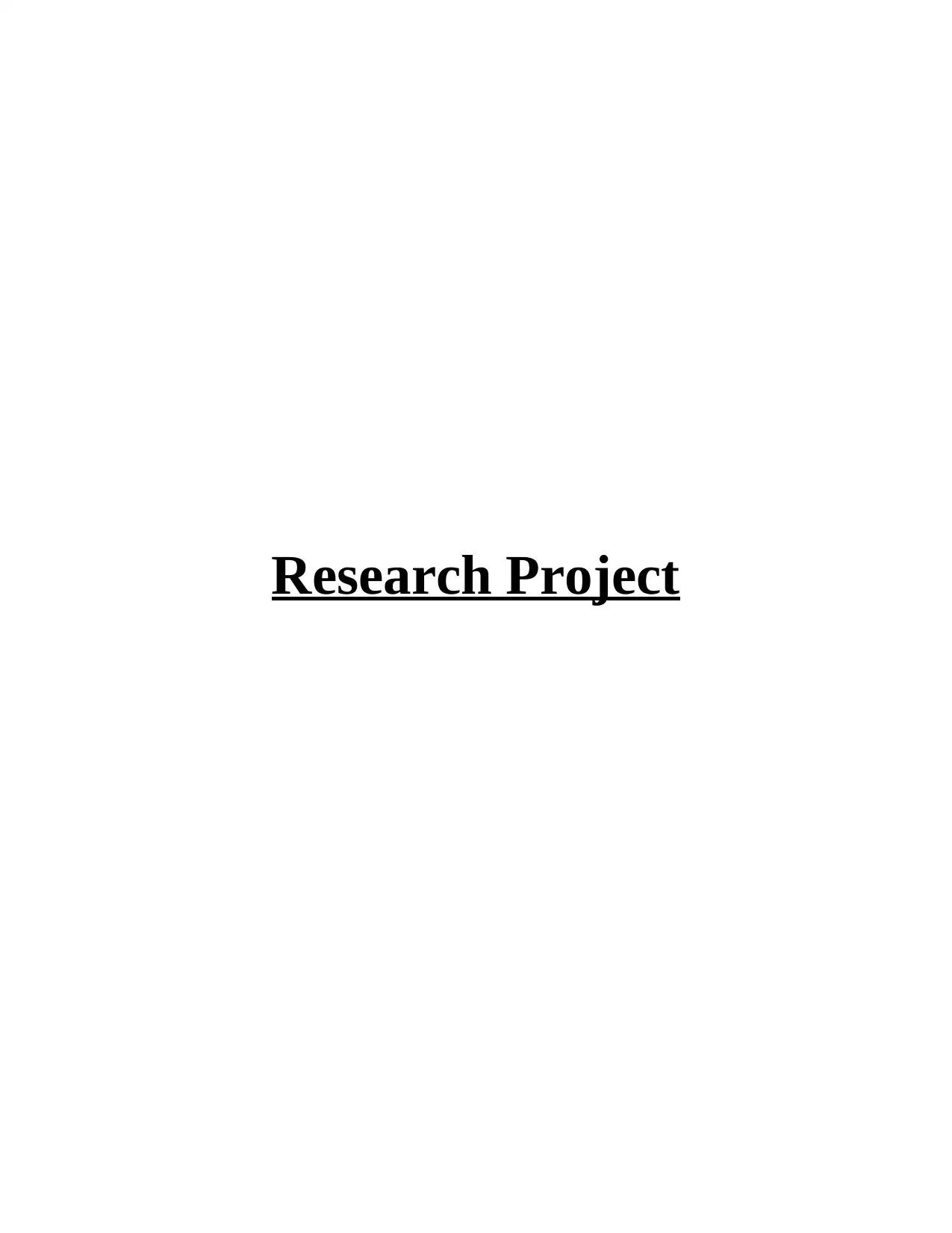
Research Project
Paraphrase This Document
Need a fresh take? Get an instant paraphrase of this document with our AI Paraphraser
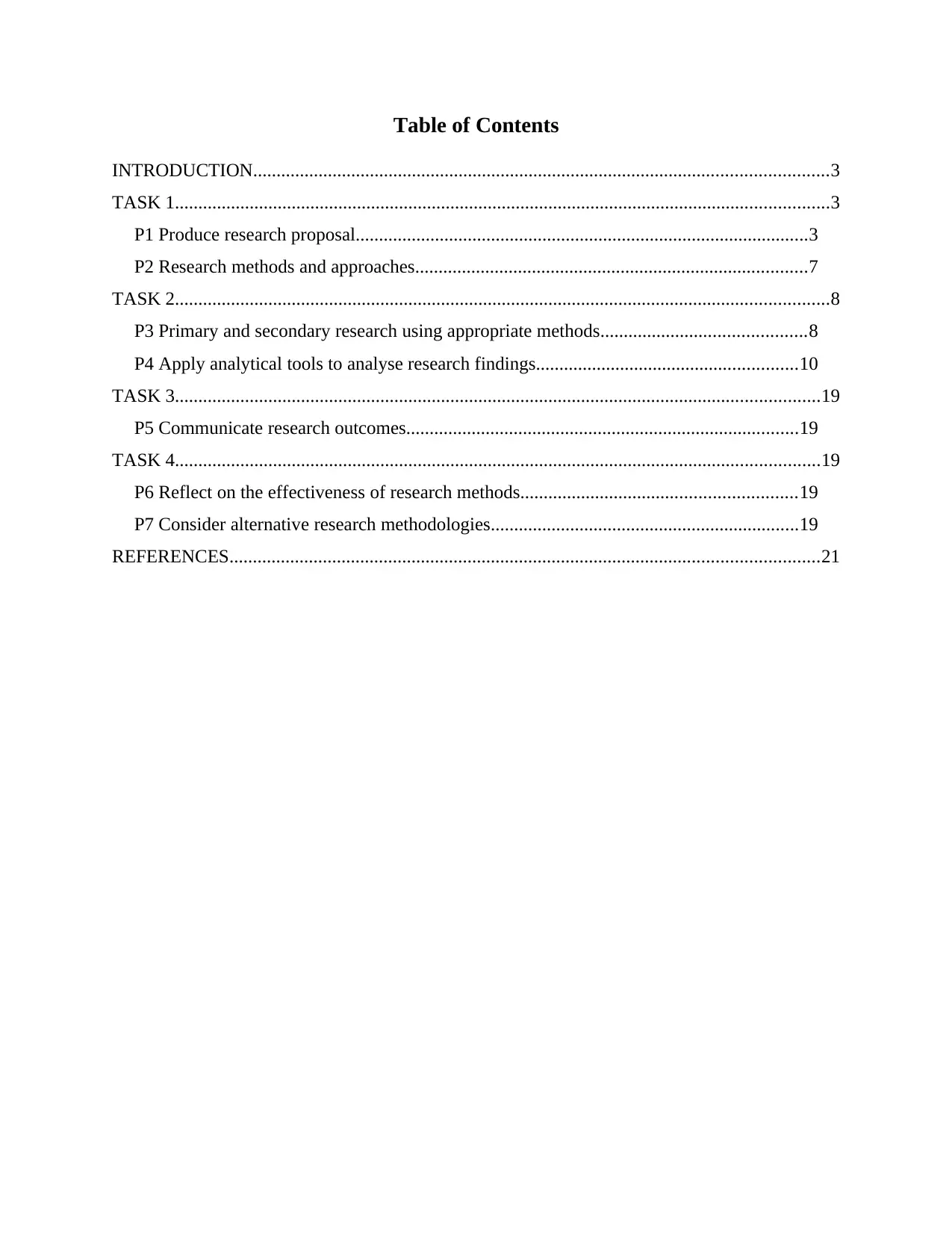
Table of Contents
INTRODUCTION...........................................................................................................................3
TASK 1............................................................................................................................................3
P1 Produce research proposal.................................................................................................3
P2 Research methods and approaches....................................................................................7
TASK 2............................................................................................................................................8
P3 Primary and secondary research using appropriate methods............................................8
P4 Apply analytical tools to analyse research findings........................................................10
TASK 3..........................................................................................................................................19
P5 Communicate research outcomes....................................................................................19
TASK 4..........................................................................................................................................19
P6 Reflect on the effectiveness of research methods...........................................................19
P7 Consider alternative research methodologies..................................................................19
REFERENCES..............................................................................................................................21
INTRODUCTION...........................................................................................................................3
TASK 1............................................................................................................................................3
P1 Produce research proposal.................................................................................................3
P2 Research methods and approaches....................................................................................7
TASK 2............................................................................................................................................8
P3 Primary and secondary research using appropriate methods............................................8
P4 Apply analytical tools to analyse research findings........................................................10
TASK 3..........................................................................................................................................19
P5 Communicate research outcomes....................................................................................19
TASK 4..........................................................................................................................................19
P6 Reflect on the effectiveness of research methods...........................................................19
P7 Consider alternative research methodologies..................................................................19
REFERENCES..............................................................................................................................21
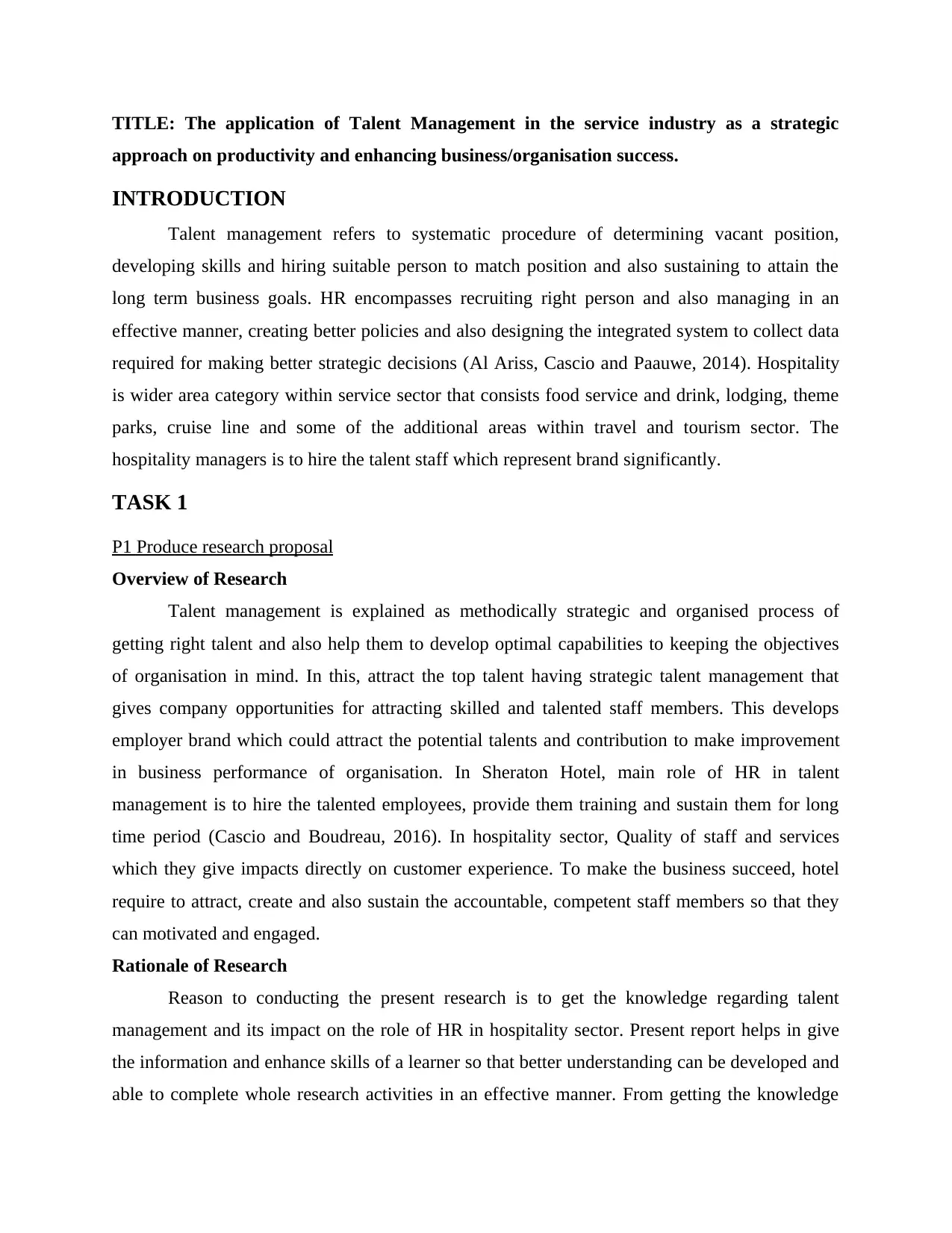
TITLE: The application of Talent Management in the service industry as a strategic
approach on productivity and enhancing business/organisation success.
INTRODUCTION
Talent management refers to systematic procedure of determining vacant position,
developing skills and hiring suitable person to match position and also sustaining to attain the
long term business goals. HR encompasses recruiting right person and also managing in an
effective manner, creating better policies and also designing the integrated system to collect data
required for making better strategic decisions (Al Ariss, Cascio and Paauwe, 2014). Hospitality
is wider area category within service sector that consists food service and drink, lodging, theme
parks, cruise line and some of the additional areas within travel and tourism sector. The
hospitality managers is to hire the talent staff which represent brand significantly.
TASK 1
P1 Produce research proposal
Overview of Research
Talent management is explained as methodically strategic and organised process of
getting right talent and also help them to develop optimal capabilities to keeping the objectives
of organisation in mind. In this, attract the top talent having strategic talent management that
gives company opportunities for attracting skilled and talented staff members. This develops
employer brand which could attract the potential talents and contribution to make improvement
in business performance of organisation. In Sheraton Hotel, main role of HR in talent
management is to hire the talented employees, provide them training and sustain them for long
time period (Cascio and Boudreau, 2016). In hospitality sector, Quality of staff and services
which they give impacts directly on customer experience. To make the business succeed, hotel
require to attract, create and also sustain the accountable, competent staff members so that they
can motivated and engaged.
Rationale of Research
Reason to conducting the present research is to get the knowledge regarding talent
management and its impact on the role of HR in hospitality sector. Present report helps in give
the information and enhance skills of a learner so that better understanding can be developed and
able to complete whole research activities in an effective manner. From getting the knowledge
approach on productivity and enhancing business/organisation success.
INTRODUCTION
Talent management refers to systematic procedure of determining vacant position,
developing skills and hiring suitable person to match position and also sustaining to attain the
long term business goals. HR encompasses recruiting right person and also managing in an
effective manner, creating better policies and also designing the integrated system to collect data
required for making better strategic decisions (Al Ariss, Cascio and Paauwe, 2014). Hospitality
is wider area category within service sector that consists food service and drink, lodging, theme
parks, cruise line and some of the additional areas within travel and tourism sector. The
hospitality managers is to hire the talent staff which represent brand significantly.
TASK 1
P1 Produce research proposal
Overview of Research
Talent management is explained as methodically strategic and organised process of
getting right talent and also help them to develop optimal capabilities to keeping the objectives
of organisation in mind. In this, attract the top talent having strategic talent management that
gives company opportunities for attracting skilled and talented staff members. This develops
employer brand which could attract the potential talents and contribution to make improvement
in business performance of organisation. In Sheraton Hotel, main role of HR in talent
management is to hire the talented employees, provide them training and sustain them for long
time period (Cascio and Boudreau, 2016). In hospitality sector, Quality of staff and services
which they give impacts directly on customer experience. To make the business succeed, hotel
require to attract, create and also sustain the accountable, competent staff members so that they
can motivated and engaged.
Rationale of Research
Reason to conducting the present research is to get the knowledge regarding talent
management and its impact on the role of HR in hospitality sector. Present report helps in give
the information and enhance skills of a learner so that better understanding can be developed and
able to complete whole research activities in an effective manner. From getting the knowledge
⊘ This is a preview!⊘
Do you want full access?
Subscribe today to unlock all pages.

Trusted by 1+ million students worldwide
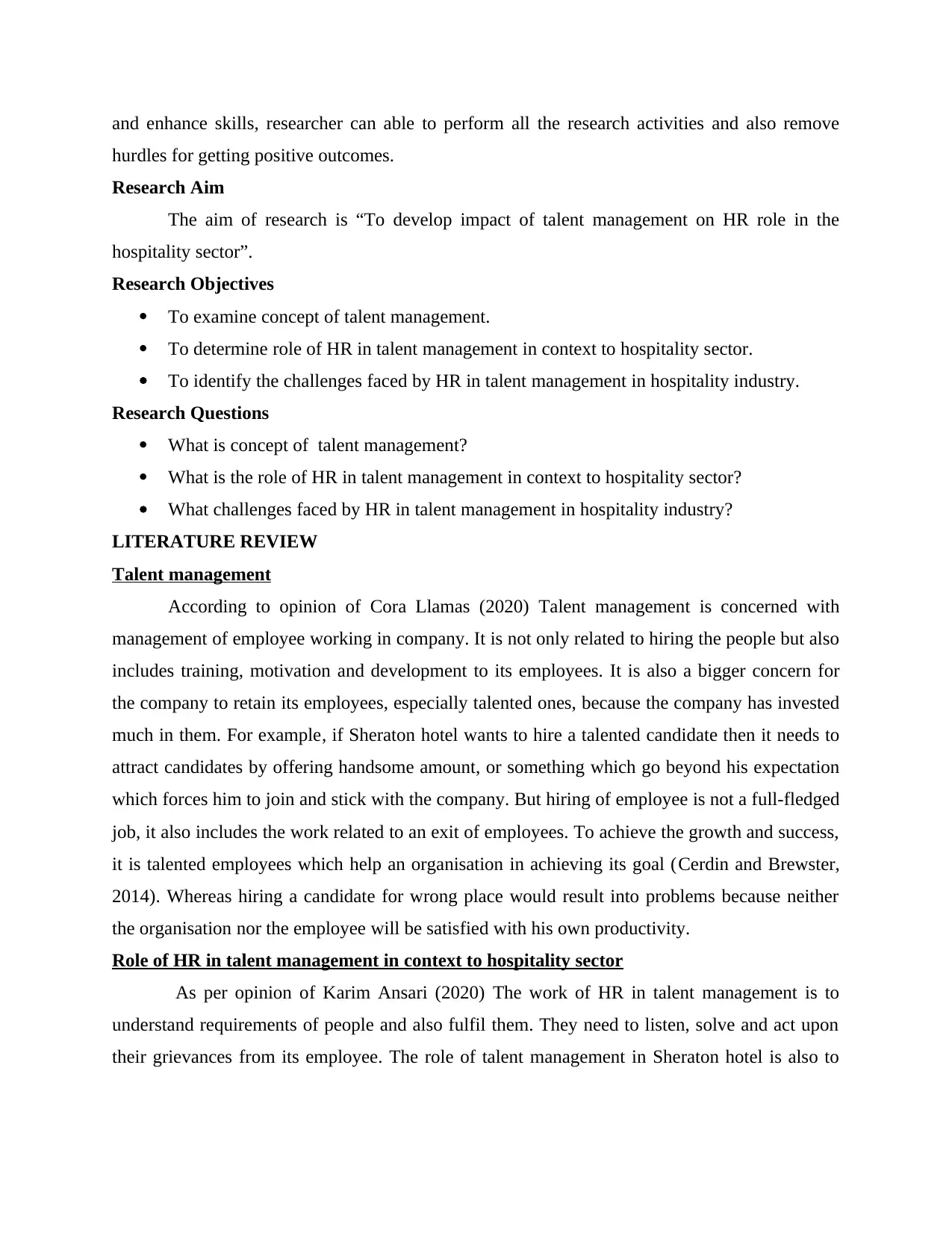
and enhance skills, researcher can able to perform all the research activities and also remove
hurdles for getting positive outcomes.
Research Aim
The aim of research is “To develop impact of talent management on HR role in the
hospitality sector”.
Research Objectives
To examine concept of talent management.
To determine role of HR in talent management in context to hospitality sector.
To identify the challenges faced by HR in talent management in hospitality industry.
Research Questions
What is concept of talent management?
What is the role of HR in talent management in context to hospitality sector?
What challenges faced by HR in talent management in hospitality industry?
LITERATURE REVIEW
Talent management
According to opinion of Cora Llamas (2020) Talent management is concerned with
management of employee working in company. It is not only related to hiring the people but also
includes training, motivation and development to its employees. It is also a bigger concern for
the company to retain its employees, especially talented ones, because the company has invested
much in them. For example, if Sheraton hotel wants to hire a talented candidate then it needs to
attract candidates by offering handsome amount, or something which go beyond his expectation
which forces him to join and stick with the company. But hiring of employee is not a full-fledged
job, it also includes the work related to an exit of employees. To achieve the growth and success,
it is talented employees which help an organisation in achieving its goal (Cerdin and Brewster,
2014). Whereas hiring a candidate for wrong place would result into problems because neither
the organisation nor the employee will be satisfied with his own productivity.
Role of HR in talent management in context to hospitality sector
As per opinion of Karim Ansari (2020) The work of HR in talent management is to
understand requirements of people and also fulfil them. They need to listen, solve and act upon
their grievances from its employee. The role of talent management in Sheraton hotel is also to
hurdles for getting positive outcomes.
Research Aim
The aim of research is “To develop impact of talent management on HR role in the
hospitality sector”.
Research Objectives
To examine concept of talent management.
To determine role of HR in talent management in context to hospitality sector.
To identify the challenges faced by HR in talent management in hospitality industry.
Research Questions
What is concept of talent management?
What is the role of HR in talent management in context to hospitality sector?
What challenges faced by HR in talent management in hospitality industry?
LITERATURE REVIEW
Talent management
According to opinion of Cora Llamas (2020) Talent management is concerned with
management of employee working in company. It is not only related to hiring the people but also
includes training, motivation and development to its employees. It is also a bigger concern for
the company to retain its employees, especially talented ones, because the company has invested
much in them. For example, if Sheraton hotel wants to hire a talented candidate then it needs to
attract candidates by offering handsome amount, or something which go beyond his expectation
which forces him to join and stick with the company. But hiring of employee is not a full-fledged
job, it also includes the work related to an exit of employees. To achieve the growth and success,
it is talented employees which help an organisation in achieving its goal (Cerdin and Brewster,
2014). Whereas hiring a candidate for wrong place would result into problems because neither
the organisation nor the employee will be satisfied with his own productivity.
Role of HR in talent management in context to hospitality sector
As per opinion of Karim Ansari (2020) The work of HR in talent management is to
understand requirements of people and also fulfil them. They need to listen, solve and act upon
their grievances from its employee. The role of talent management in Sheraton hotel is also to
Paraphrase This Document
Need a fresh take? Get an instant paraphrase of this document with our AI Paraphraser
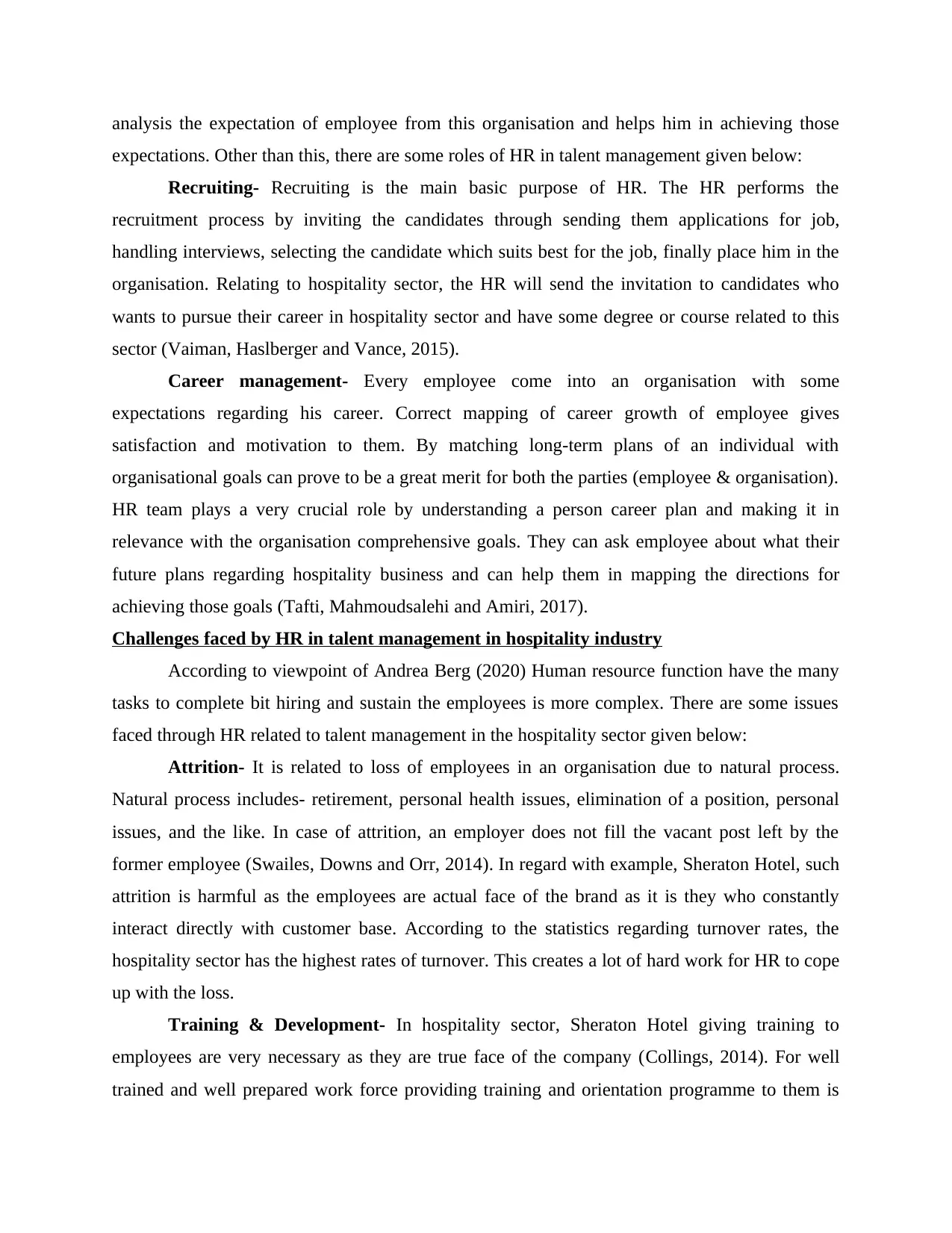
analysis the expectation of employee from this organisation and helps him in achieving those
expectations. Other than this, there are some roles of HR in talent management given below:
Recruiting- Recruiting is the main basic purpose of HR. The HR performs the
recruitment process by inviting the candidates through sending them applications for job,
handling interviews, selecting the candidate which suits best for the job, finally place him in the
organisation. Relating to hospitality sector, the HR will send the invitation to candidates who
wants to pursue their career in hospitality sector and have some degree or course related to this
sector (Vaiman, Haslberger and Vance, 2015).
Career management- Every employee come into an organisation with some
expectations regarding his career. Correct mapping of career growth of employee gives
satisfaction and motivation to them. By matching long-term plans of an individual with
organisational goals can prove to be a great merit for both the parties (employee & organisation).
HR team plays a very crucial role by understanding a person career plan and making it in
relevance with the organisation comprehensive goals. They can ask employee about what their
future plans regarding hospitality business and can help them in mapping the directions for
achieving those goals (Tafti, Mahmoudsalehi and Amiri, 2017).
Challenges faced by HR in talent management in hospitality industry
According to viewpoint of Andrea Berg (2020) Human resource function have the many
tasks to complete bit hiring and sustain the employees is more complex. There are some issues
faced through HR related to talent management in the hospitality sector given below:
Attrition- It is related to loss of employees in an organisation due to natural process.
Natural process includes- retirement, personal health issues, elimination of a position, personal
issues, and the like. In case of attrition, an employer does not fill the vacant post left by the
former employee (Swailes, Downs and Orr, 2014). In regard with example, Sheraton Hotel, such
attrition is harmful as the employees are actual face of the brand as it is they who constantly
interact directly with customer base. According to the statistics regarding turnover rates, the
hospitality sector has the highest rates of turnover. This creates a lot of hard work for HR to cope
up with the loss.
Training & Development- In hospitality sector, Sheraton Hotel giving training to
employees are very necessary as they are true face of the company (Collings, 2014). For well
trained and well prepared work force providing training and orientation programme to them is
expectations. Other than this, there are some roles of HR in talent management given below:
Recruiting- Recruiting is the main basic purpose of HR. The HR performs the
recruitment process by inviting the candidates through sending them applications for job,
handling interviews, selecting the candidate which suits best for the job, finally place him in the
organisation. Relating to hospitality sector, the HR will send the invitation to candidates who
wants to pursue their career in hospitality sector and have some degree or course related to this
sector (Vaiman, Haslberger and Vance, 2015).
Career management- Every employee come into an organisation with some
expectations regarding his career. Correct mapping of career growth of employee gives
satisfaction and motivation to them. By matching long-term plans of an individual with
organisational goals can prove to be a great merit for both the parties (employee & organisation).
HR team plays a very crucial role by understanding a person career plan and making it in
relevance with the organisation comprehensive goals. They can ask employee about what their
future plans regarding hospitality business and can help them in mapping the directions for
achieving those goals (Tafti, Mahmoudsalehi and Amiri, 2017).
Challenges faced by HR in talent management in hospitality industry
According to viewpoint of Andrea Berg (2020) Human resource function have the many
tasks to complete bit hiring and sustain the employees is more complex. There are some issues
faced through HR related to talent management in the hospitality sector given below:
Attrition- It is related to loss of employees in an organisation due to natural process.
Natural process includes- retirement, personal health issues, elimination of a position, personal
issues, and the like. In case of attrition, an employer does not fill the vacant post left by the
former employee (Swailes, Downs and Orr, 2014). In regard with example, Sheraton Hotel, such
attrition is harmful as the employees are actual face of the brand as it is they who constantly
interact directly with customer base. According to the statistics regarding turnover rates, the
hospitality sector has the highest rates of turnover. This creates a lot of hard work for HR to cope
up with the loss.
Training & Development- In hospitality sector, Sheraton Hotel giving training to
employees are very necessary as they are true face of the company (Collings, 2014). For well
trained and well prepared work force providing training and orientation programme to them is
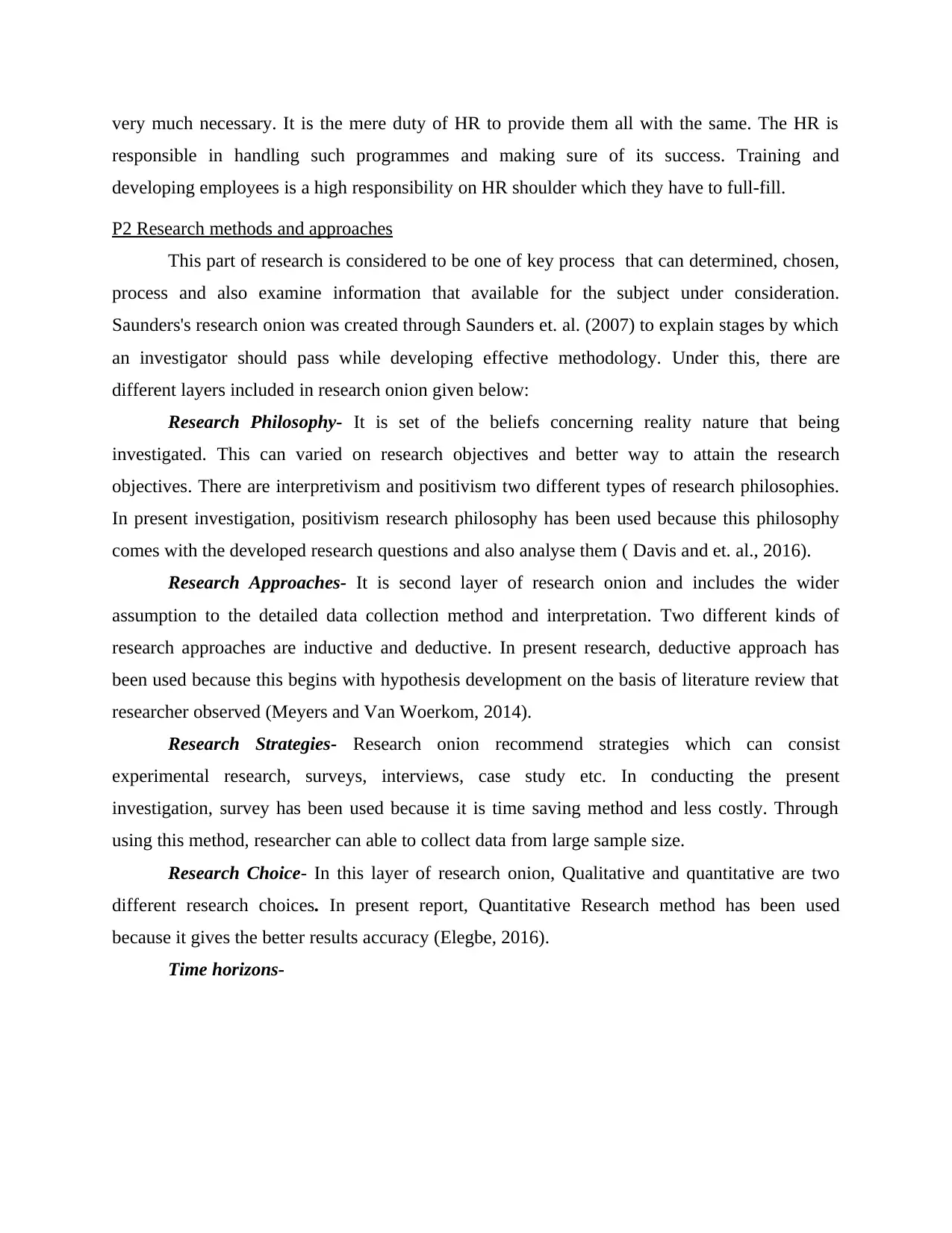
very much necessary. It is the mere duty of HR to provide them all with the same. The HR is
responsible in handling such programmes and making sure of its success. Training and
developing employees is a high responsibility on HR shoulder which they have to full-fill.
P2 Research methods and approaches
This part of research is considered to be one of key process that can determined, chosen,
process and also examine information that available for the subject under consideration.
Saunders's research onion was created through Saunders et. al. (2007) to explain stages by which
an investigator should pass while developing effective methodology. Under this, there are
different layers included in research onion given below:
Research Philosophy- It is set of the beliefs concerning reality nature that being
investigated. This can varied on research objectives and better way to attain the research
objectives. There are interpretivism and positivism two different types of research philosophies.
In present investigation, positivism research philosophy has been used because this philosophy
comes with the developed research questions and also analyse them ( Davis and et. al., 2016).
Research Approaches- It is second layer of research onion and includes the wider
assumption to the detailed data collection method and interpretation. Two different kinds of
research approaches are inductive and deductive. In present research, deductive approach has
been used because this begins with hypothesis development on the basis of literature review that
researcher observed (Meyers and Van Woerkom, 2014).
Research Strategies- Research onion recommend strategies which can consist
experimental research, surveys, interviews, case study etc. In conducting the present
investigation, survey has been used because it is time saving method and less costly. Through
using this method, researcher can able to collect data from large sample size.
Research Choice- In this layer of research onion, Qualitative and quantitative are two
different research choices. In present report, Quantitative Research method has been used
because it gives the better results accuracy (Elegbe, 2016).
Time horizons-
responsible in handling such programmes and making sure of its success. Training and
developing employees is a high responsibility on HR shoulder which they have to full-fill.
P2 Research methods and approaches
This part of research is considered to be one of key process that can determined, chosen,
process and also examine information that available for the subject under consideration.
Saunders's research onion was created through Saunders et. al. (2007) to explain stages by which
an investigator should pass while developing effective methodology. Under this, there are
different layers included in research onion given below:
Research Philosophy- It is set of the beliefs concerning reality nature that being
investigated. This can varied on research objectives and better way to attain the research
objectives. There are interpretivism and positivism two different types of research philosophies.
In present investigation, positivism research philosophy has been used because this philosophy
comes with the developed research questions and also analyse them ( Davis and et. al., 2016).
Research Approaches- It is second layer of research onion and includes the wider
assumption to the detailed data collection method and interpretation. Two different kinds of
research approaches are inductive and deductive. In present research, deductive approach has
been used because this begins with hypothesis development on the basis of literature review that
researcher observed (Meyers and Van Woerkom, 2014).
Research Strategies- Research onion recommend strategies which can consist
experimental research, surveys, interviews, case study etc. In conducting the present
investigation, survey has been used because it is time saving method and less costly. Through
using this method, researcher can able to collect data from large sample size.
Research Choice- In this layer of research onion, Qualitative and quantitative are two
different research choices. In present report, Quantitative Research method has been used
because it gives the better results accuracy (Elegbe, 2016).
Time horizons-
⊘ This is a preview!⊘
Do you want full access?
Subscribe today to unlock all pages.

Trusted by 1+ million students worldwide
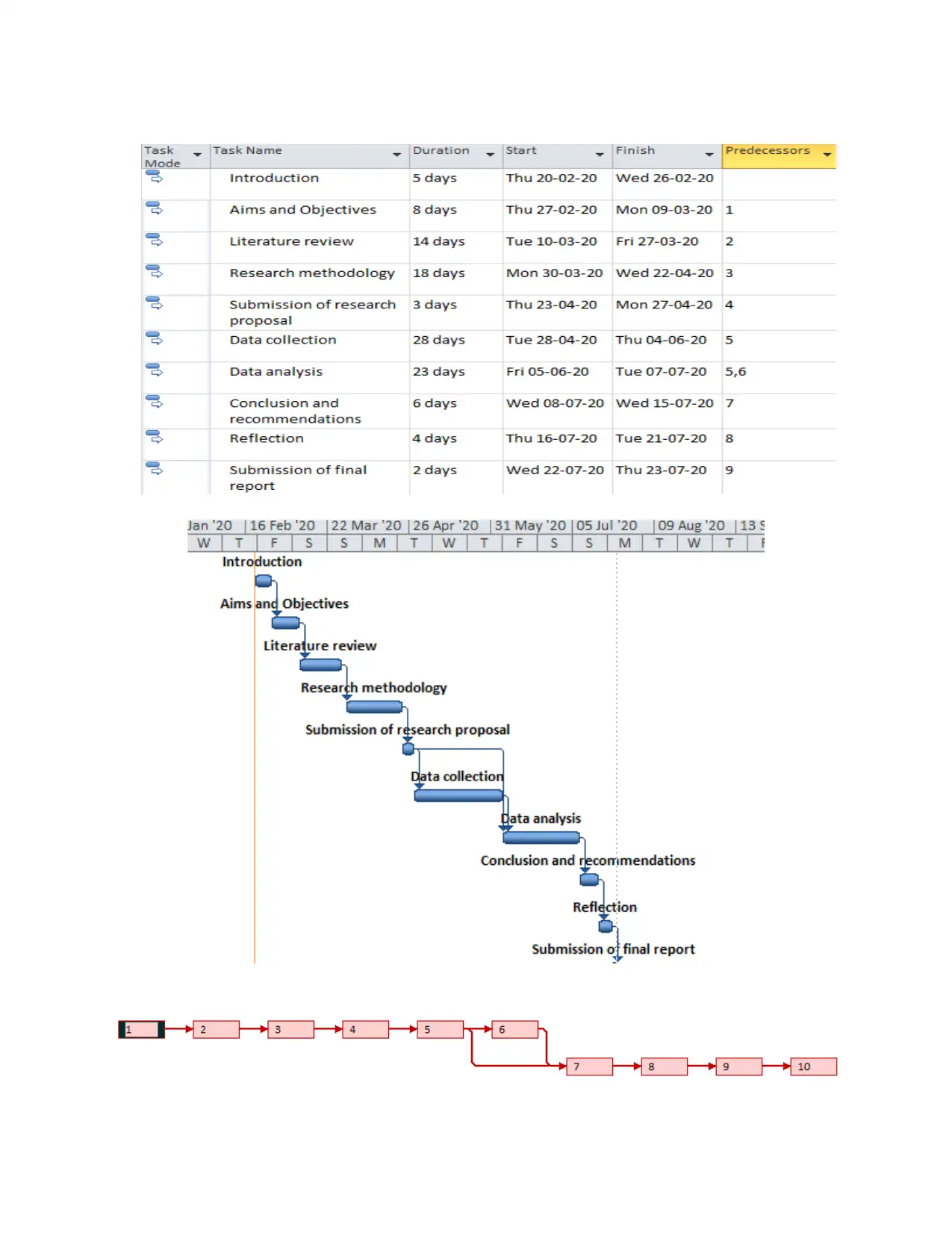
Paraphrase This Document
Need a fresh take? Get an instant paraphrase of this document with our AI Paraphraser
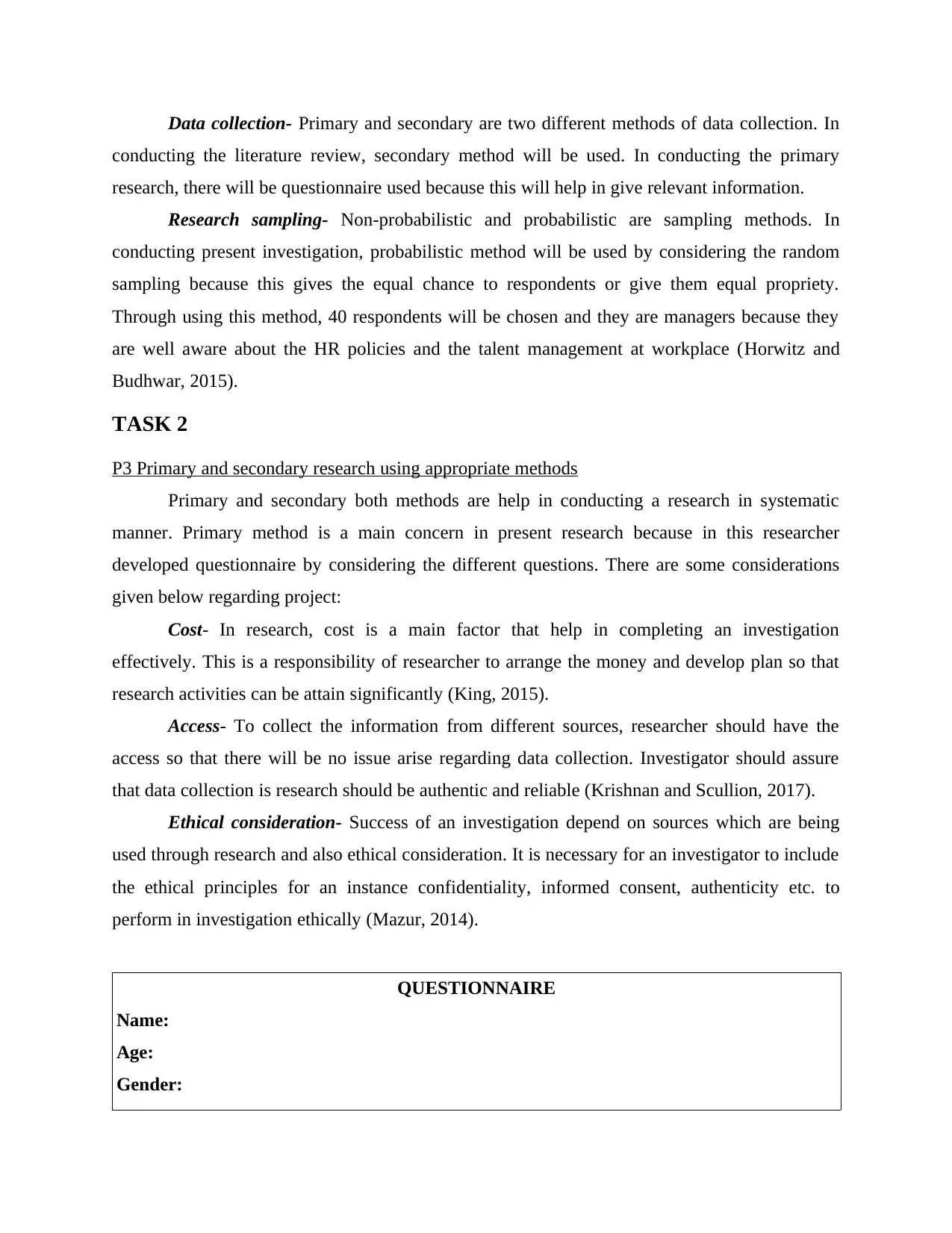
Data collection- Primary and secondary are two different methods of data collection. In
conducting the literature review, secondary method will be used. In conducting the primary
research, there will be questionnaire used because this will help in give relevant information.
Research sampling- Non-probabilistic and probabilistic are sampling methods. In
conducting present investigation, probabilistic method will be used by considering the random
sampling because this gives the equal chance to respondents or give them equal propriety.
Through using this method, 40 respondents will be chosen and they are managers because they
are well aware about the HR policies and the talent management at workplace (Horwitz and
Budhwar, 2015).
TASK 2
P3 Primary and secondary research using appropriate methods
Primary and secondary both methods are help in conducting a research in systematic
manner. Primary method is a main concern in present research because in this researcher
developed questionnaire by considering the different questions. There are some considerations
given below regarding project:
Cost- In research, cost is a main factor that help in completing an investigation
effectively. This is a responsibility of researcher to arrange the money and develop plan so that
research activities can be attain significantly (King, 2015).
Access- To collect the information from different sources, researcher should have the
access so that there will be no issue arise regarding data collection. Investigator should assure
that data collection is research should be authentic and reliable (Krishnan and Scullion, 2017).
Ethical consideration- Success of an investigation depend on sources which are being
used through research and also ethical consideration. It is necessary for an investigator to include
the ethical principles for an instance confidentiality, informed consent, authenticity etc. to
perform in investigation ethically (Mazur, 2014).
QUESTIONNAIRE
Name:
Age:
Gender:
conducting the literature review, secondary method will be used. In conducting the primary
research, there will be questionnaire used because this will help in give relevant information.
Research sampling- Non-probabilistic and probabilistic are sampling methods. In
conducting present investigation, probabilistic method will be used by considering the random
sampling because this gives the equal chance to respondents or give them equal propriety.
Through using this method, 40 respondents will be chosen and they are managers because they
are well aware about the HR policies and the talent management at workplace (Horwitz and
Budhwar, 2015).
TASK 2
P3 Primary and secondary research using appropriate methods
Primary and secondary both methods are help in conducting a research in systematic
manner. Primary method is a main concern in present research because in this researcher
developed questionnaire by considering the different questions. There are some considerations
given below regarding project:
Cost- In research, cost is a main factor that help in completing an investigation
effectively. This is a responsibility of researcher to arrange the money and develop plan so that
research activities can be attain significantly (King, 2015).
Access- To collect the information from different sources, researcher should have the
access so that there will be no issue arise regarding data collection. Investigator should assure
that data collection is research should be authentic and reliable (Krishnan and Scullion, 2017).
Ethical consideration- Success of an investigation depend on sources which are being
used through research and also ethical consideration. It is necessary for an investigator to include
the ethical principles for an instance confidentiality, informed consent, authenticity etc. to
perform in investigation ethically (Mazur, 2014).
QUESTIONNAIRE
Name:
Age:
Gender:
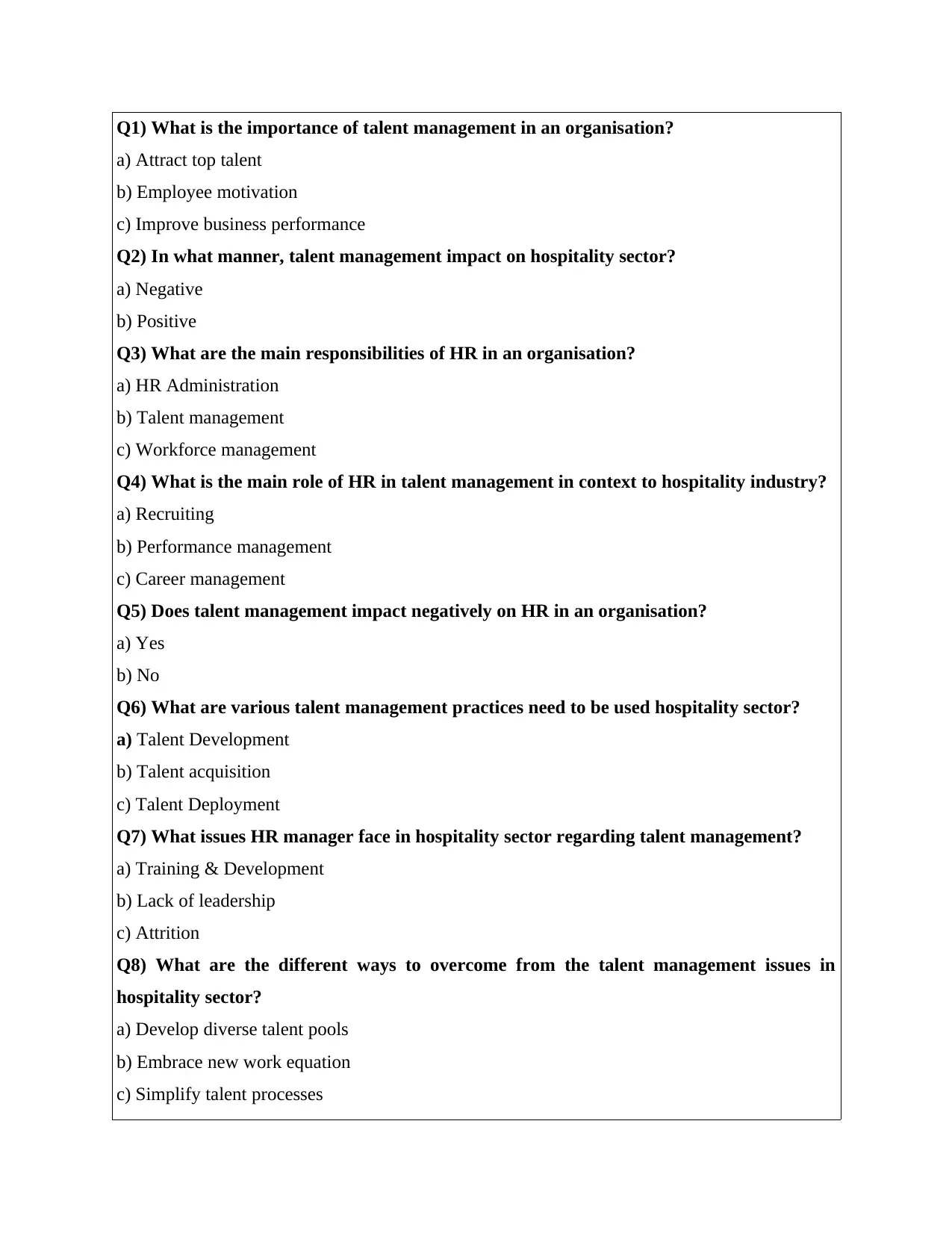
Q1) What is the importance of talent management in an organisation?
a) Attract top talent
b) Employee motivation
c) Improve business performance
Q2) In what manner, talent management impact on hospitality sector?
a) Negative
b) Positive
Q3) What are the main responsibilities of HR in an organisation?
a) HR Administration
b) Talent management
c) Workforce management
Q4) What is the main role of HR in talent management in context to hospitality industry?
a) Recruiting
b) Performance management
c) Career management
Q5) Does talent management impact negatively on HR in an organisation?
a) Yes
b) No
Q6) What are various talent management practices need to be used hospitality sector?
a) Talent Development
b) Talent acquisition
c) Talent Deployment
Q7) What issues HR manager face in hospitality sector regarding talent management?
a) Training & Development
b) Lack of leadership
c) Attrition
Q8) What are the different ways to overcome from the talent management issues in
hospitality sector?
a) Develop diverse talent pools
b) Embrace new work equation
c) Simplify talent processes
a) Attract top talent
b) Employee motivation
c) Improve business performance
Q2) In what manner, talent management impact on hospitality sector?
a) Negative
b) Positive
Q3) What are the main responsibilities of HR in an organisation?
a) HR Administration
b) Talent management
c) Workforce management
Q4) What is the main role of HR in talent management in context to hospitality industry?
a) Recruiting
b) Performance management
c) Career management
Q5) Does talent management impact negatively on HR in an organisation?
a) Yes
b) No
Q6) What are various talent management practices need to be used hospitality sector?
a) Talent Development
b) Talent acquisition
c) Talent Deployment
Q7) What issues HR manager face in hospitality sector regarding talent management?
a) Training & Development
b) Lack of leadership
c) Attrition
Q8) What are the different ways to overcome from the talent management issues in
hospitality sector?
a) Develop diverse talent pools
b) Embrace new work equation
c) Simplify talent processes
⊘ This is a preview!⊘
Do you want full access?
Subscribe today to unlock all pages.

Trusted by 1+ million students worldwide
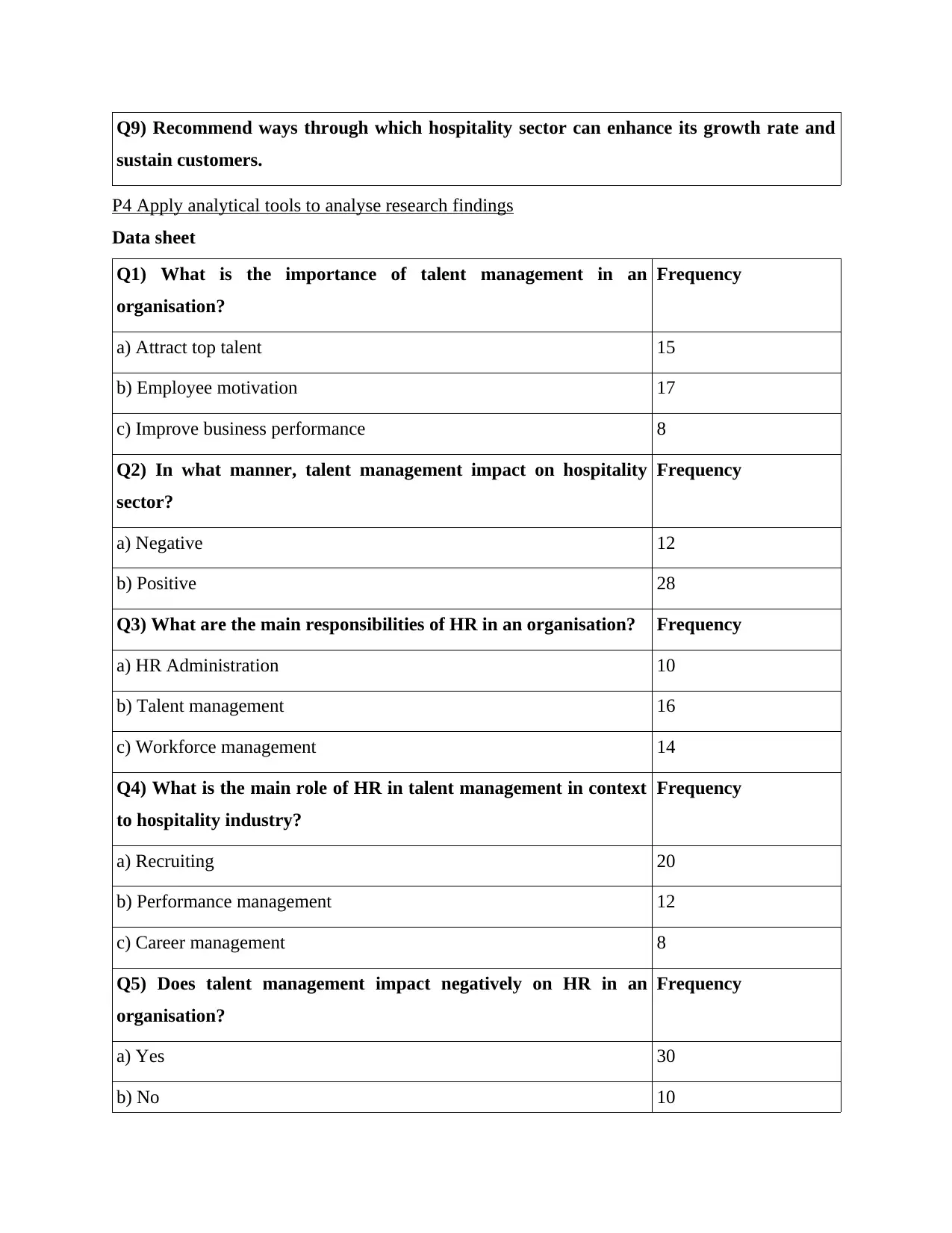
Q9) Recommend ways through which hospitality sector can enhance its growth rate and
sustain customers.
P4 Apply analytical tools to analyse research findings
Data sheet
Q1) What is the importance of talent management in an
organisation?
Frequency
a) Attract top talent 15
b) Employee motivation 17
c) Improve business performance 8
Q2) In what manner, talent management impact on hospitality
sector?
Frequency
a) Negative 12
b) Positive 28
Q3) What are the main responsibilities of HR in an organisation? Frequency
a) HR Administration 10
b) Talent management 16
c) Workforce management 14
Q4) What is the main role of HR in talent management in context
to hospitality industry?
Frequency
a) Recruiting 20
b) Performance management 12
c) Career management 8
Q5) Does talent management impact negatively on HR in an
organisation?
Frequency
a) Yes 30
b) No 10
sustain customers.
P4 Apply analytical tools to analyse research findings
Data sheet
Q1) What is the importance of talent management in an
organisation?
Frequency
a) Attract top talent 15
b) Employee motivation 17
c) Improve business performance 8
Q2) In what manner, talent management impact on hospitality
sector?
Frequency
a) Negative 12
b) Positive 28
Q3) What are the main responsibilities of HR in an organisation? Frequency
a) HR Administration 10
b) Talent management 16
c) Workforce management 14
Q4) What is the main role of HR in talent management in context
to hospitality industry?
Frequency
a) Recruiting 20
b) Performance management 12
c) Career management 8
Q5) Does talent management impact negatively on HR in an
organisation?
Frequency
a) Yes 30
b) No 10
Paraphrase This Document
Need a fresh take? Get an instant paraphrase of this document with our AI Paraphraser
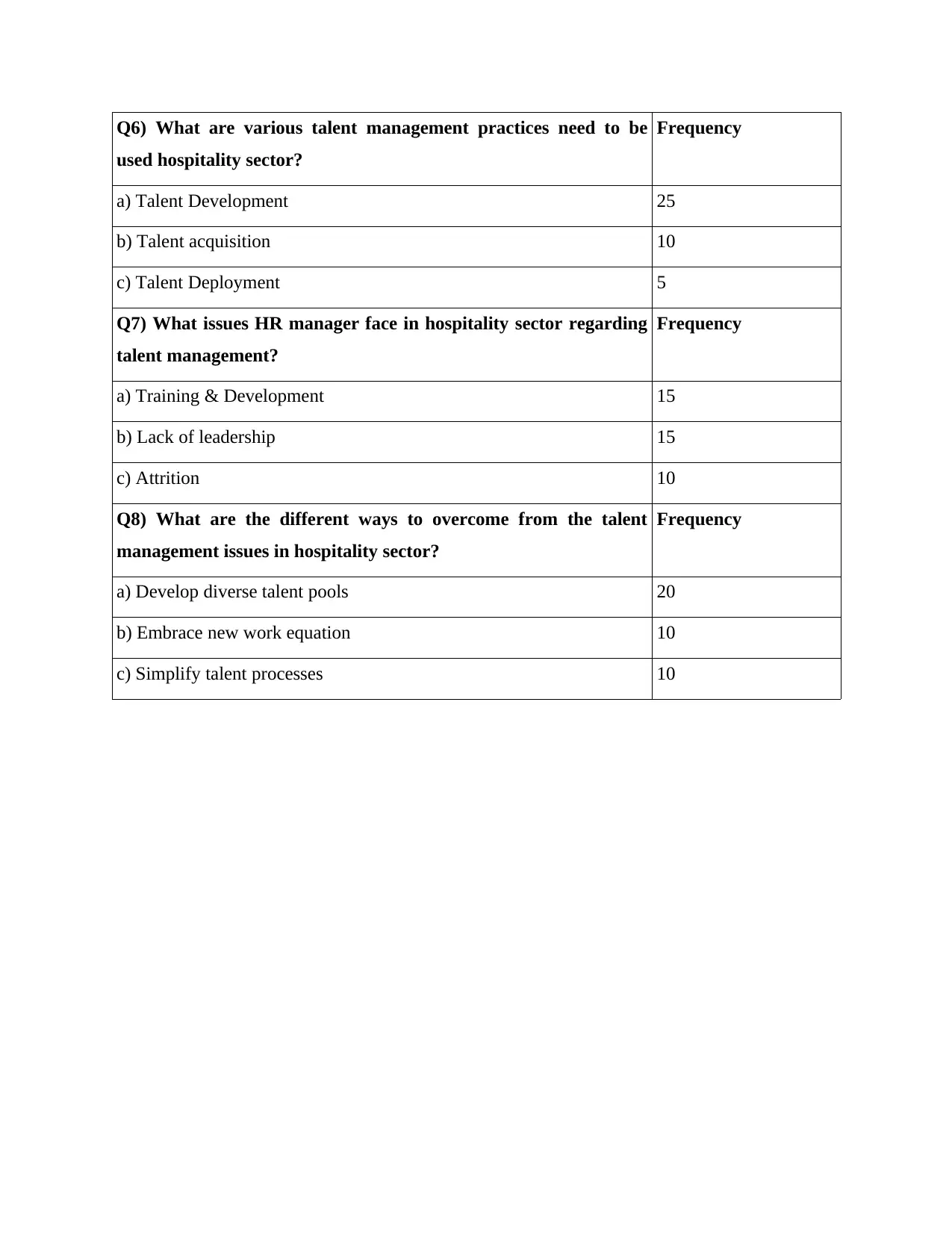
Q6) What are various talent management practices need to be
used hospitality sector?
Frequency
a) Talent Development 25
b) Talent acquisition 10
c) Talent Deployment 5
Q7) What issues HR manager face in hospitality sector regarding
talent management?
Frequency
a) Training & Development 15
b) Lack of leadership 15
c) Attrition 10
Q8) What are the different ways to overcome from the talent
management issues in hospitality sector?
Frequency
a) Develop diverse talent pools 20
b) Embrace new work equation 10
c) Simplify talent processes 10
used hospitality sector?
Frequency
a) Talent Development 25
b) Talent acquisition 10
c) Talent Deployment 5
Q7) What issues HR manager face in hospitality sector regarding
talent management?
Frequency
a) Training & Development 15
b) Lack of leadership 15
c) Attrition 10
Q8) What are the different ways to overcome from the talent
management issues in hospitality sector?
Frequency
a) Develop diverse talent pools 20
b) Embrace new work equation 10
c) Simplify talent processes 10
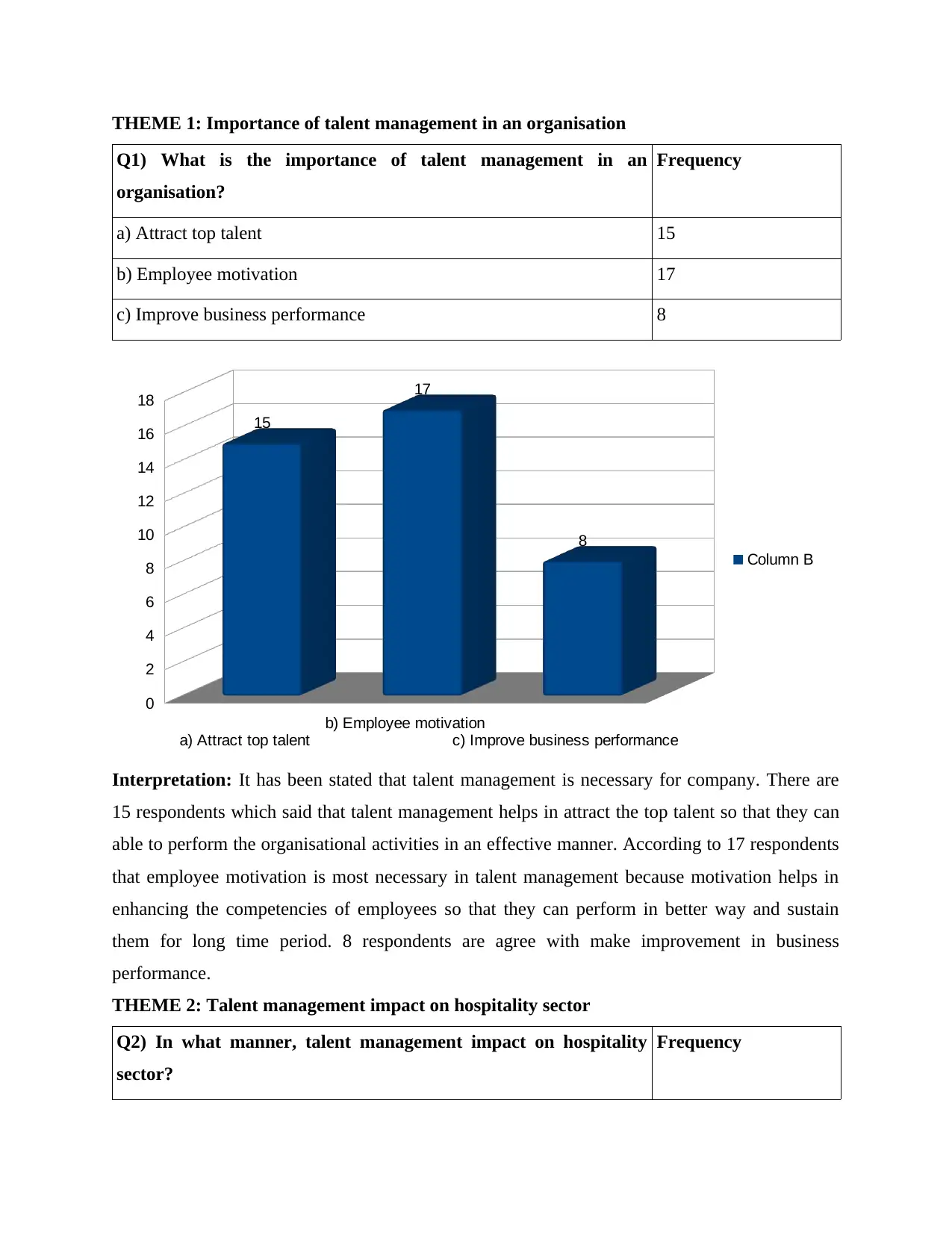
THEME 1: Importance of talent management in an organisation
Q1) What is the importance of talent management in an
organisation?
Frequency
a) Attract top talent 15
b) Employee motivation 17
c) Improve business performance 8
Interpretation: It has been stated that talent management is necessary for company. There are
15 respondents which said that talent management helps in attract the top talent so that they can
able to perform the organisational activities in an effective manner. According to 17 respondents
that employee motivation is most necessary in talent management because motivation helps in
enhancing the competencies of employees so that they can perform in better way and sustain
them for long time period. 8 respondents are agree with make improvement in business
performance.
THEME 2: Talent management impact on hospitality sector
Q2) In what manner, talent management impact on hospitality
sector?
Frequency
a) Attract top talent
b) Employee motivation
c) Improve business performance
0
2
4
6
8
10
12
14
16
18
15
17
8
Column B
Q1) What is the importance of talent management in an
organisation?
Frequency
a) Attract top talent 15
b) Employee motivation 17
c) Improve business performance 8
Interpretation: It has been stated that talent management is necessary for company. There are
15 respondents which said that talent management helps in attract the top talent so that they can
able to perform the organisational activities in an effective manner. According to 17 respondents
that employee motivation is most necessary in talent management because motivation helps in
enhancing the competencies of employees so that they can perform in better way and sustain
them for long time period. 8 respondents are agree with make improvement in business
performance.
THEME 2: Talent management impact on hospitality sector
Q2) In what manner, talent management impact on hospitality
sector?
Frequency
a) Attract top talent
b) Employee motivation
c) Improve business performance
0
2
4
6
8
10
12
14
16
18
15
17
8
Column B
⊘ This is a preview!⊘
Do you want full access?
Subscribe today to unlock all pages.

Trusted by 1+ million students worldwide
1 out of 23
Related Documents
Your All-in-One AI-Powered Toolkit for Academic Success.
+13062052269
info@desklib.com
Available 24*7 on WhatsApp / Email
![[object Object]](/_next/static/media/star-bottom.7253800d.svg)
Unlock your academic potential
Copyright © 2020–2026 A2Z Services. All Rights Reserved. Developed and managed by ZUCOL.





